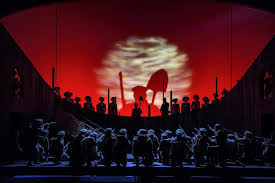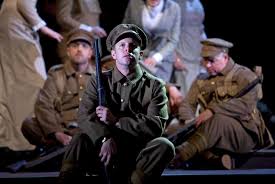Wales Millenium Centre, Friday 13 May 2016
There was nothing unlucky about this Friday-the-thirteenth. WNO was celebrating its Seventieth Birthday with the premiere of Iain Bell’s In Parenthesis. The text by David Antrobus and Emma Jenkins is drawn from the epic poem by David Jones, himself a survivor of the attack on Mametz Wood a hundred years ago. However, this is no piece of historical re-enactment for the poem draws on Welsh Saga literature to frame the narrative and to find for us, perplexed witnesses of the events, a way to make sense and even find reconciliation.
Few new operas these days have such a profoundly moving starting point and the text itself is masterly in its avoidance of operatic pitfalls. As such the movement from ethereal chorus to men on the march is made effortlessly and the characterisation is succinct but frequently profound. The strong cast draws on a number of very familiar faces, amongst whom Graham Clark’s Baldric-like Marne Sergeant and Donald Maxwell’s splendid Dai Greatcoat are outstanding, though the balance of individuality against the overriding importance of the idea of the group is never lost. For this, Iain Bell’s score is heavily responsible. He is not afraid of writing substantial choruses for both the Dryads and the regiment – choruses which are forceful and tuneful at the same time without ever seeming derivative. The new tunes he creates for familiar songs, the warmly moving setting of Sosban fach and the final overwhelming effect of the Salve Regina for women’s voices, point to a deep understanding of how opera functions and can do so without needing to break any musical rules along the way.
If the choral writing is splendid, so also are the lyrical lines for the solo parts. Andrew Bidlack has the high tessitura for Private Ball and his many brief solos have the lyricism and beauty the poem expects. The character is poised somewhere between Peter Grimes and Albert Herring – brash and clumsy at first but later having the spiritual insight of Grimes even when surrounded by danger and chaos. The pub scene which opens the second half is reminiscent of the scene after the storm in Britten’s opera, and has the same balance of warm humanity and a cosmic essence which takes us literally into a different world.
The final scene is the most moving. All but Ball are dead but where most operas would end with a dirge for the dead, here we meet transformation. The dark, often bleak, skies are hidden behind a lush spring tree in full bud. The Queen of the Wood, the versatile Alexandra Deshorties, brings fertility back to the earth and regeneration where there was despair. It is a hope beyond hope and one which is both moving and convincing.
David Poutney returns to good form in mounting this production and draws exemplary performances from his cast. It is superbly lit by Malcolm Rippeth in an un-fussy set from Robert Innes Hopkins.
It was equally pleasing to welcome back Carlo Rizzi into the pit and to note he will also be conducting Cav & Pag as part of the summer season. His sensitivity and rapport with his singers is unfailing, and he showed absolute respect for them and the work itself.
There are more performances in Cardiff until 3 June when the production moves to Birmingham and then for two performances at the Royal Opera House. Do catch it if you can. Let us hope it will return again in the not too distant future – a work of this quality should not be lost.


